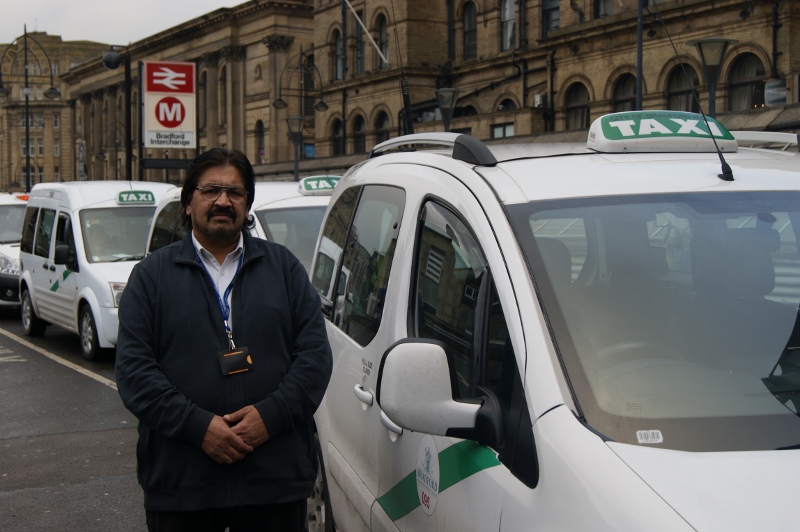The salwar kameez is a traditional South Asian dress and will have at some stage, been worn by countless British Pakistanis up and down the country.
One group of people who this dress has become linked to, arguably more than any other, are taxi drivers.

In part two of Asian Express’s ‘Great Big Taxi Debate’ we ask what the consensus is about drivers wearing salwar kameez or whether a uniform would be a more professional alternative.
Around Yorkshire, in particular, there is an abundance of Pakistani taxi drivers, many of whom started their trade decades ago. However, there are a large number of cabbies who will opt to wear traditional clothing while on the job and this has caused a flurry of mixed comments from the Asian community itself over the years.
Whether it is for convenience or other reasons, there’s growing debate on whether Asians need to change their ways.
Mafooz Hussain, a taxi driver working with a Leeds private car hire firm, agreed there needed to be a stricter dress code to ensure more professionalism from taxi drivers. He considers them as one on the frontline of representing the South Asian communities.
“I think many Asians don’t take the job seriously enough to be honest, and it’s a hell of an important job.

“I think we need more professional-looking drivers. If we wear uniforms for example people respect you a lot more, whereas you see many who put their salwar kameez on, which they’ve probably had on while a sleep, and then just jump into their taxis and turn up to work.
“Many of them don’t even leave their cabs because they don’t want anyone to see what they’re wearing. I’d say that if they’re embarrassed themselves, then it’s a good indicator that they need to wear something decent. If you have respect for how you look then others will treat you with some respect in return.
“I really do think customers who are seeing Asian taxi drivers in salwar kameez, all the old stereotypes come flooding back.”
The 48-year-old of Leeds said Asians needed to move on with the times.
He argues it’s not really a religious thing and was more of a cultural tradition so didn’t see what the problem was in changing it.
He added: “Yes I understand a lot of them went into the trade when they first came into this country, but things were different then. Things have changed now and we have to change as well.
“It definitely puts people off. If you give off a good image then people are going to respect you.
“If I wasn’t Asian and got into a cab with a driver who had a full length beard, oily hair and salwar kameez on, I would feel a bit weird as well.”
Mafooz said everybody must work harder to look after their customers and feel safe and comfortable in their presence.
He added: “A lot of drivers don’t even speak to their passengers, sometimes because they can’t speak English too well, but also because they can’t be bothered – that can come across as being rude.
“I just hope that we wake up as a community and start moving with the times, because what we do is very difficult and the hours are long. We want to reverse the negative stereotypes that have been created.”
There was an outcry last year in Pendle after a council proposed a dress code that outlawed traditional Asian clothing. Taxi drivers claimed racial discrimination.
The borough council wanted a stricter dress code to smarten up the drivers. Tracksuits, shorts, football and rugby tops, beachwear, short skirts, short dresses and flip flops were due to be banned, as well as dirty or ripped clothing, and items with “offensive” or “suggestive” words or graphics.
The majority of Pendle’s taxi drivers are Asian men, and many felt the rules discriminated against them.
In a report to a meeting considering the plans, the council said: “Whilst Pendle council does not wish to impose such standards by way of conditions to any licence, we expect, however, that such standards will be maintained at all times.”
Mr *********of Bradford who thinks drivers should be able to wear what they want, said: “A lot of taxi drivers around here are Asian and you can’t force Asian people to adhere to a code that doesn’t include their national dress.
“As long as the taxi drivers look smart and presentable there shouldn’t be a problem.
“It’s ridiculous to suggest imposing a dress code.
“Some people do wear the salwar kameez because they are in and out of mosque quite a lot. So this means that you are stopping people from adequately practicing their faith which I definitely do not agree with.”
Mohammed Shafiq, chief executive of the Ramadhan Foundation, said taxi drivers could look smart in traditional dress. He said that it would not be acceptable to tell people to change clothing they wore for religious requirements or duties.
“People spend more time tackling real issues such as the safety of taxi drivers instead of pointing the finger,” he said.
Helen Whitecroft a 21-year-old university student said she regularly used taxis after going out with her friends.
She added: “I don’t really see it as a big problem, I don’t really look at what people are wearing when I’m in a taxi, I just want to get to wherever I’m going.”
However, 23-year-old Ismail Basharat added the trade could do with being improved: “I think it would be much more professional if we had a uniform of some kind, everyone would benefit.
“There’s nothing wrong with salwar kameez, but I think people will think someone is unapproachable in the dress, whereas a suit looks a bit more professional.”
Miss Khan from Leeds said: “I don’t think it’s unreasonable to ask taxi drivers to smarten up. I do however believe that negative stereotypes of people wearing salwar kameez kick in more regularly.
“The generic view of non-Asian people is that if you wear salwar kameez, you’re a bit dumb. I know that’s wrong, but that’s the way it is.
“If taxi drivers respected this country and earn a living here, there’s absolutely no harm in requesting for them to dress in smart trousers and shirt. Men in Pakistan don’t have a problem wearing trousers and shirts, so what’s the big problem?
“Has anyone considered that by ditching the salwar kameez at work in the UK is a positive step in changing the image of integration from the community?
“I read somewhere that 60 per cent of white people in this country felt that Muslims are not part of British life.
“We have to change as a community and all do our part to integrate as much as we can each allow to change racism and prejudices in Britain.”













